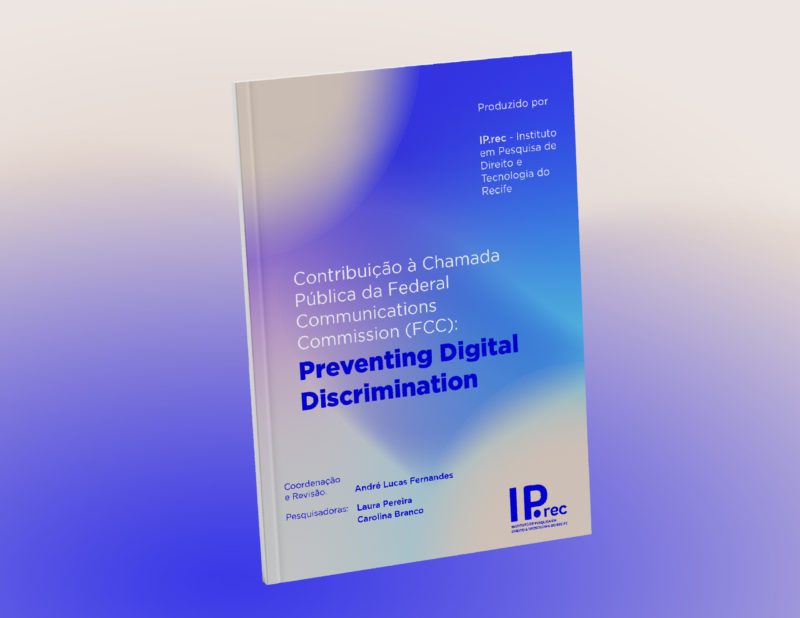 Blog
Blog
New government, old challenges: the digital rights agenda for 2023 and the challenges of Lula’s administration
Internet governance and multisectoralism Algorithms and artificial intelligence
A new government begins, a new chapter of hope in the country. After four years of setbacks, especially with regard to the defense of fundamental rights, Brazil enters a period in which we can finally talk about democracy, social participation, defense of human rights, inclusion, diversity, among many other terms that were forgotten by the last administration. However, we are not yet entirely safe from challenges and problems regarding the agenda of digital rights. This seems to gain some prominence mainly after the attack that occurred in Brasília on January 8, which shows us that we need to be attentive and strong for the regulatory challenges that present themselves.
Platform Regulation
The issue of regulating Internet platforms has been in the spotlight since the 2018 elections, when social networks and private messaging services were used by representatives of the far-right for the mass dissemination of content that led voters to misinformation. At that time, as well as in subsequent events, the urgent need to regulate digital platform services, such as social networks, private messaging services, and search engines, became evident, in order to introduce new obligations and, consequently, new responsibilities to the companies that own these services.
In the year 2020, Bill 2630 was filed in the Senate, which was initially an attempt to mitigate the risks of using digital platforms for the dissemination of misinformation, but which, over the course of the legislative process, became a more general law for the regulation of platforms, also containing some measures necessary to combat fake news. The Bill was approved in the Senate but was widely debated and modified in the Chamber of Deputies, where it remains pending a vote on its merits.
In reaction to the attacks on the headquarters of the Republic’s powers on January 8, 2023, which were mainly organized and disseminated through the Internet, the current government began to advocate for punishment for these companies and attempted to adopt a provisional measure containing provisions that would give digital platforms new obligations regarding content that attacks the Democratic State of Law and threatens democracy, the constituted powers, or authorities. However, the reaction to this measure was extremely negative, on the part of civil society, which pointed out that establishing such measures via a provisional measure would prevent more structured social participation in the drafting of the text, in addition to disregarding all the accumulated knowledge built around the topic in the debates of Bill 2630, which is more mature, although some points deserve greater attention and a deeper debate.
From then on, the government’s discourse changed and it began to advocate that it should take advantage of the debate already done around Bill 2630, presenting proposals that encompass the government’s objectives. We must then wait for the unfolding of the next chapters.
Personal data protection and the criminal sphere
The use of personal data in criminal investigations has been the subject of a constant interpretive battle, as the General Data Protection Law expressly excludes its application for this purpose (Art. 4, III), but the Federal Constitution guarantees, in Art. 5, LXXIX, the protection of personal data as a fundamental right.
In 2020, a preliminary draft of the Criminal LGPD (General Data Protection Law) was prepared by a Commission of Jurists established by the Chamber of Deputies for this purpose. The Commission was chaired by Minister Nefi Cordeiro of the Superior Court of Justice and had the Professor from the University of Brasília, Laura Schertel, as rapporteur. It also included expert members such as Jaqueline de Abreu, Vladimir Aras, Danilo Doneda, and Tércio Sampaio Ferraz Júnior. However, the proposal has not yet been submitted as a bill.
In 2022, Deputy Coronel Armando filed Bill 1515/2022, which deals with the same subject matter but in a completely different way than that of the draft prepared by the Commission of Jurists. Bill 1515/2022 has serious flaws, which were pointed out by the Coalition for Rights on the Network in a statement sent to the President of the Chamber of Deputies, Arthur Lira, last year.
In addition to this bill, there is also the reform of the Code of Criminal Procedure, which includes a section dedicated to the production of evidence in digital means. In this field, there is a concern from civil society regarding the text under discussion, given that it promotes an excessive expansion of the hypotheses that authorize data retention measures for subsequent investigations without due consideration for safeguards of fundamental rights for the investigated individual. This adds to the debate on government hacking, which was the subject of a study by IP.rec published in 2022, revealing that all states, as well as the federal government, have tools for collecting data from electronic devices and are using them by taking advantage of this legislative vacuum. Therefore, it is necessary to strike a balance between evidence collection and fundamental rights.
Here, it is also worth mentioning the debate on the use of facial recognition in public security. The Coalition for Rights on the Network has been leading the campaign “Take My Face Off Your Target” with broad participation from civil society across the country. The campaign draws attention to the recurring failures, reported by the media and supported by scientific studies, of the use of facial recognition in this area, especially regarding the recognition of black and transgender individuals, but also due to the surveillance it promotes. A similar debate is taking place in Recife, through the campaign “No Camera in My Face,” due to the initiative of the City Hall of Recife to install cameras equipped with facial recognition in 108 clocks scattered throughout the city. IP.rec published an open letter against the project, joined by dozens of entities from across the country, and has been participating in various actions on the matter, but the City Hall has proceeded with the initiative, threatening the privacy of citizens in Recife.
Artificial Intelligence
The regulation of Artificial Intelligence is also set to be a hot topic in 2023 for those working with technology.
In 2021, Bill 21/2020 was approved in the Chamber of Deputies, with various issues raised by civil society, including haste and, as a result, the lack of extensive debates with the interested sectors, in addition to the complexity of the subject and the legislator’s merely principled approach.
Upon arriving at the Senate, Bill 21 was appended to several others dealing with the same subject, and a Commission of Jurists was established to prepare a substitute for the Bill in question. After a series of public hearings, with participation from IP.rec in two of them, and written contributions, the Commission drafted a text, which was approved and is now ready for debate on the floor.
However, despite advancing in relation to the text that came from the Chamber of Deputies, several problems were still pointed out by academics and entities of civil society. The risk grading without specific prohibitions, the civil liability regime, and the mechanisms of transparency are some points deserving negative emphasis in the text, while there is recognized progress in the attempt to seek a reconciliation between regulatory approaches based on risks and rights, as well as recognizing that AI-based systems are not neutral and have discriminatory biases.
In summary
It seems that 2023 promises to be eventful in terms of the formulation of public policies for the use of technology. We hope that these debates will be conducted in a broad manner, listening to the various interested sectors and based on the public interest and scientific evidence, balancing regulatory needs and fundamental rights.

